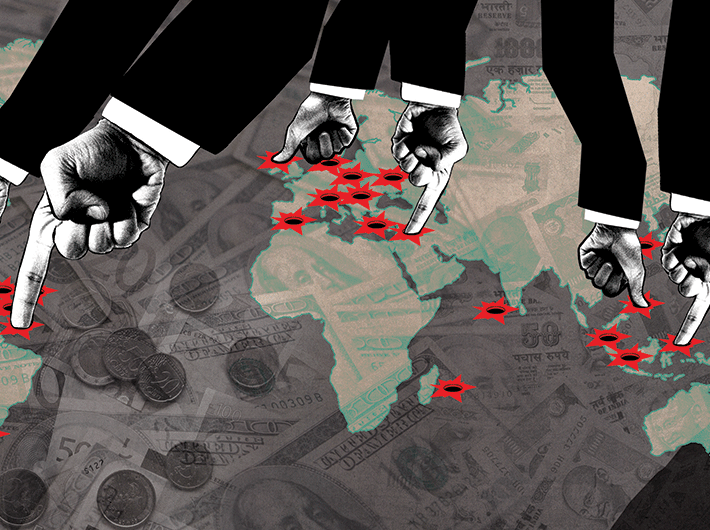India has no leverage on either Indians who have money abroad or on the countries where they hold it
The Brisbane Exhibition and Convention Centre hosted a show recently entitled Delivering Global Economic Resilience. The introductory performer, Angel Gurria, is director general of Organisation for Economic Cooperation and Development (OECD). Countries are sovereign and can decide how much to tax their residents: some tax them less, so rich people and businesses go and set up headquarters in such tax havens, and avoid taxes in tax-hungry nations. That is inconvenient for governments that like to spend a lot on children, old people, armies, etc., – typically, governments of rich countries, whose trade union OECD happens to be. Their nationals change their residence, go and live in a tax haven like Switzerland or Ireland. That is very uncomfortable for expensive governments of rich countries.
They first tried to persuade the tax havens to control their havenliness. They asked the havens to sign treaties promising to become less attractive. In 2007, there were 40 such treaties; today they are 3,000, and this pile is pretty useless. It is impossible to find out whether countries are honouring the treaties or not; so treaties have proved ineffective in reducing tax avoidance.
So then, the rich countries formed a trade union called Global Forum on Transparency and Exchange of Tax Information, which now has 120 members, and designed a model treaty called Common Reporting Standard for Automatic Exchange of Tax Information. They settled on taking measures to combat Base Erosion and Profit Shifting. OECD did an audit of the measures, and issued over 70 Compliance Ratings and made over 500 recommendations to amend their laws.
Now, OECD tells us that 51 countries have promised to do Automatic Exchange of Tax Information following the Common Reporting Standard by 2017, and that another 42 countries will follow in 2018. Their exchange of information has already yielded 37 billion euros from information exchange programmes in five years. That is roughly 0.06 per cent of OECD members’ revenue. But it should not be underestimated; it will grow in coming years to 0.1 per cent, 0.5 per cent, even 1 per cent some day.
In the past year, the OECD delivered seven measures to stop Base Erosion and Profit Sharing. They have been adopted by 44 countries, including all the G20 countries. Another eight will be ready in a year. Ireland has promised to give up the Double Irish ploy. It works like this. A business operating in Ireland makes its company in Ireland a subsidiary of another company in a tax haven; its profits in Ireland are shown as belonging to the subsidiary, and taxed at the much lower rate of the tax haven. Then they are transferred back to Ireland.
The device led to loss of corporate tax revenue to Ireland, but it did not mind because the tax-avoiding companies employed people in Ireland. But it has now promised to give up this practice that made it prosper. Now, all the 30 members of OECD have signed a Model Tax Convention, and agreed to share tax information.
The new government in India has taken a leading role in the campaign against tax evasion. The Bharatiya Janata Party had carried on a campaign against the previous government, alleging that it was not acting to bring back “black money” that had been parked abroad. No wonder, therefore, that Narendra Modi offered support to exchange of information and mutual support in chasing tax revenue. He called for policy coordination amongst major countries, not just to eliminate tax evasion, but to address security issues such as terrorism, drug trafficking and arms smuggling, not to mention cyber security.
With so much verbal action, success is just round the corner. Or is it? The great leaders of the world may go on declaring their intention to destroy all they find undesirable. But one needs only one tax haven in the world for all the profits to be sent there and escape taxes. The tax haven may find it difficult to stay in tax evasion business if it depends on major neighbours and they can put pressure on it; Switzerland, for example, had to yield last year after Germany told it to stop taking deposits from German citizens who used to load their cars with suitcases of cash and leave them in Swiss banks. But the German tax evaders could still transfer their money to some other tax haven. And as the Swiss ambassador has been telling Indians, Switzerland would not get Indian investors into trouble with the Indian government unless the latter could prove that the former had broken some law.
It is easy to get excited and to make fiery self-righteous speeches. But it is sheer waste of time. The world is so structured that India has no leverage on either Indians who have money abroad or on the countries where they hold it. Jaitley will keep boasting about modest action against a handful of people; but he is only throwing dust into people’s eyes. It would be far better to create a fair and stable tax system that would attract people from all over the world to bring their money to India. If that sounds like turning India into a tax haven, so be it.
The article appears in December 16-31, 2014, issue

